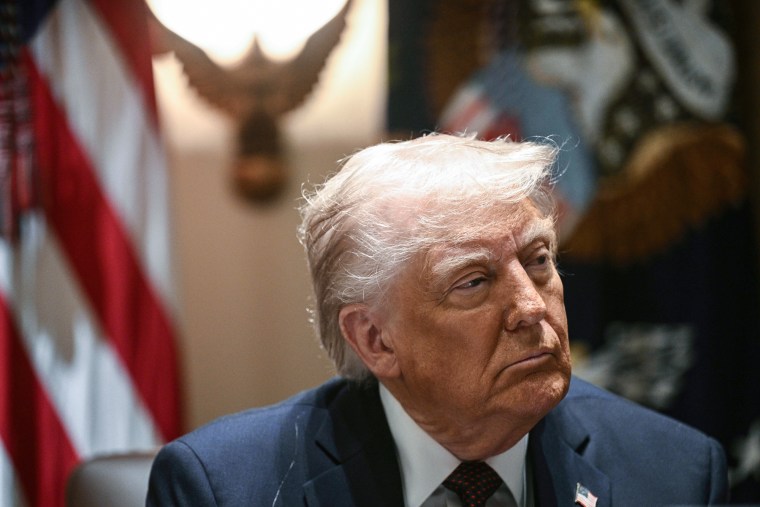WASHINGTON — Moving at a rapid-fire clip, Donald Trump has been concentrating power in his hands, pushing the bounds of executive authority while effectively muzzling an array of voices that pose threats to his agenda.
Trump is using the multiple levers that a president commands both to neuter institutions he has scorned and reward others that align with his worldview.
One by one, he is bending ostensibly independent actors under the weight of his power. So far, Trump has targeted the legal community, universities, the arts, career government employees and the press and brought them to heel in some measure, willingly or not. Law firms with even indirect ties to past investigations of Trump now face punitive measures that could put them out of business.
If Trump prevails by the end of his term, he’ll have influenced who votes in American elections and who does not, who gets to stay in America and who must leave, who pays off their student loans and who gets relief, who gets to question the president and who doesn’t.
He’s facing pushback, but working to sweep it away. A pliant Congress has largely forsaken its oversight role since Trump thundered back into office, leaving the courts as the main impediment to his ambitions. And Trump is challenging their authority with a resolve that has nudged the nation closer to a constitutional crisis than at any point in the last half century.
Pessimistic about government’s ability to hold Trump to account, one U.S. senator said a mass uprising may be the only means of derailing his plans.
“Ultimately, popular mobilization” is the only way to tame Trump, Sen. Chris Murphy, D-Conn., said in an interview. The nation’s fate may come down to “the people on both the right and the left rising up in protest and demanding reform.”
Pressuring universities and law firms
As he sets about to remake the country, Trump has employed a mix of blunt tools.
Pushing into social and cultural realms that past presidents largely avoided, he used federal funds as leverage in pressuring Columbia University to make changes that could reshape what students learn about the Middle East, Africa and South Asia. (Columbia’s interim president, Katrina Armstrong, resigned last week.)
In an operation that could chill free speech, the Trump administration has been picking up foreign students and sending them to detention centers over what appears to be their involvement in the pro-Palestinian protest movement last year.
Most of the students have been in the U.S. legally, but Secretary of State Marco Rubio said Thursday that he has revoked more than 300 student visas to date and is not about to stop.
“Every time I find one of these lunatics, I take away their visas,” Rubio said at a news conference.
One student targeted for deportation is Momodou Taal, a Cornell University graduate student and U.S. visa holder who took part in protests at the school supporting Palestinians in Gaza.
In an interview, Cornell President Michael Kotlikoff said the university “hasn’t gotten direct notification” that the student’s visa was revoked.
“It’s very difficult to talk about this because we don’t know the basis upon which many of these actions are occurring,” he said.
“If someone is being targeted for expressing their political opinions, of course that would be concerning,” Kotlikoff added. “It’s something that we would urge and provide counsel for people to take the appropriate steps.”
Trump cowed a prestigious law firm — Paul Weiss — into pledging millions of dollars in pro bono work on behalf of causes he’s championed by threatening measures that could have cost the firm substantial business.
In an executive order targeting the firm, Trump singled out one of its former partners, Mark Pomerantz, who had worked to develop a criminal case against Trump during a stint at the Manhattan District Attorney’s Office several years ago.
“I’m the biggest proponent of President Trump and I was stunned at how rapidly they collapsed,” said Steve Bannon, a former senior White House official in Trump’s first term. “This just tells you we’ve got to do it to every university and you have to do it to every law firm.”
On Thursday night, Trump signed another executive order punishing a different law firm that has crossed him. He yanked government contracts with WilmerHale and imposed other sanctions, citing in part its hiring of Robert Mueller and two other attorneys who took part in a Justice Department investigation into allegations that Russia meddled in the 2016 election on Trump’s behalf. Mueller retired from the firm four years ago.
“WilmerHale rewarded Robert Mueller and two of his colleagues by welcoming them to the firm after they wielded the power of the federal government to lead a partisan ‘investigation’ against the president and others,” the action reads.
The two other lawyers that Trump mentioned, James Quarles and Aaron Zebley, co-wrote a book about the case, “Interference,” that was published last year. Quarles is listed on the firm’s website as a retired partner; Zebley as a partner.
Trump denied any wrongdoing, and he was not charged in the investigation. He repeatedly dismissed the Mueller investigation as a “witch hunt.”
WilmerHale sued the Trump administration on Friday, saying the president’s actions against such firms is “unprecedented and unconstitutional.” Later in the day, U.S. District Judge Richard Leon issued a ruling temporarily blocking the Trump administration’s move to cancel contracts with the firm and forbid federal agencies from hiring its employees.
“There is no doubt that this retaliatory action chills free speech and legal advocacy, or that it qualifies as a constitutional harm,” the judge wrote.
A total of six elite law firms have come within Trump’s crosshairs. Another one — Skadden, Arps, Slate, Meagher & Flom — sidestepped an executive order and accompanying punitive action by reaching what Trump termed Friday “essentially a settlement.” The firm is to provide $100 million in free legal services as a condition of the agreement, Trump said.
The firm’s executive partner, Jeremy London, said in a prepared statement: “We engaged proactively with the president and his team in working together constructively to reach this agreement. The firm looks forward to continuing our productive relationship with President Trump and his administration. We firmly believe that this outcome is in the best interests of our clients, our people, and our firm.”
‘It’s all gas, no brakes’
On a different front, Trump issued an executive order earlier this month that may dissuade people from working at public service organizations that take part in activities of which he disapproves.
The move would potentially deny student loan forgiveness to those working at groups supporting undocumented immigrants and transgender care for youth, or taking part in protest activities deemed a “public nuisance.”
“What we’re seeing is a consolidation of power in the presidency which is unprecedented,” said Matthew Platkin, New Jersey’s attorney general. “We’ve never seen a president assert this kind of control over the press, universities, free speech, law firms, people who disagree with him, the judiciary, the election system and the personnel who make up the federal government.”
“They’re following the authoritarian playbook, which is to do as many things as fast as you can to the point where it’s almost impossible to keep up,” he added.
Another institution facing newfound pressure is the free press. The Trump White House ended a long-standing practice of letting journalists choose who among their print and radio peers are admitted into a tight pool covering smaller presidential events.
Instead, the White House is adding more right-leaning outlets and exerting more control over who gets in and who doesn’t. Among those admitted into the Oval Office on Friday for a Q&A with Trump was One America News Network, whose reporter asked the president, “What has made you and your team so effective in finding, locating, apprehending and deporting these violent, illegal migrants.”
“I love this guy,” Trump said — not for the first time.
Barred from the room was The Associated Press, the wire service that raised Trump’s ire in refusing to amend its style guide to refer to the Gulf of Mexico as the “Gulf of America,” Trump’s new name for the body of water.
Even the arts are falling within Trump’s ambit. He revamped the board of the Kennedy Center in Washington, D.C., and assumed the chairmanship, meaning he is now something of a tastemaker when it comes to music and theater.
At a board meeting earlier this month, Trump said he doesn’t like the sorts of people the center has previously honored for their lifetime artistic achievements. One of the names floated as a possible future honoree was Sylvester Stallone, who last year referred to Trump as “the second George Washington.”
“In the past, I mean, these are radical left lunatics that have been chosen. I didn’t like it. I couldn’t watch it. And the host was always terrible,” he said, according to a recording of the meeting obtained by The Washington Post.
In response to the Trumpian takeover, the show “Hamilton” canceled a planned appearance at the Kennedy Center, giving rise to a series of ironies. A musical about the architects of America’s delicate system of checks and balances is boycotting a president who is testing those same constitutional guardrails.
Alexander Hamilton wrote in the Federalist Papers that “energy in the executive” is crucial to good government. Two centuries later, the question is whether Trump is spending too much energy too quickly, with too little forbearance.

“Some of this happened last time,” said Chris Edelson, an assistant professor of government at American University. “What’s dangerous now is he [Trump] seems to be having more success with this. You have companies settling lawsuits with him. Columbia and Paul Weiss are going along with this. That’s dangerous stuff.”
“I don’t think it will appease him,” he added. “He will want more.”
Trump allies want much more. Now that his methods have met with some success, Trump should feel emboldened to go further, Bannon said.
“Go to the big state universities and tell them to either purge your faculties of these radicals or we’ll cut you off from the money,” Bannon said. “These people have no pushback. They talk a big game, but once you cut back the money, they fold. They’re addicted to government cash. So use the addiction against them.”
“It’s all gas, no brakes,” Bannon added.
Election changes
Indeed, there is no sign that Trump is letting up. A sweeping executive order that he signed Tuesday would upend the nation’s election system — a particular interest of a president who still insists he won the 2020 election that forced him from office. Some of Trump’s supporters, Bannon included, want to find a way for him to run again in 2028, though the Constitution forbids a third term.
The order demands that the Election Assistance Commission put in place a proof of citizenship requirement that would require people to show a U.S. passport or similar document to register to vote. Nearly half of all Americans don’t have a passport, meaning Trump’s order, if implemented, could disenfranchise millions of Americans. In the order, Trump said the actions were necessary to stop noncitizens from voting, though such cases are rare.
What’s more, the order assumes power that presidents lack, legal experts said. Elections are decentralized, with the Constitution giving Congress and the states authority over how they’re run. Election law experts say the president lacks the legal authority to set new requirements for voter registration or to direct the Election Assistance Commission — an independent, bipartisan body.
Judicial pushback
An argument that Trump allies make is that he is exercising power that is rightfully his. A slew of congressional legislation in the post-Watergate period curtailed presidential authority. Trump is reclaiming part of it under what’s known as the “unitary executive theory.”
The idea is that the president, as the duly elected head of the executive branch, has discretion to fire any of the millions of federal workers serving under him.
And Trump has been doing just that. Thousands of workers have been pushed out of their jobs as Trump and his aide-de-camp, Elon Musk, work to shrink the size of government.
Polling shows that Americans don’t necessarily want to see a presidency with expanded power. An NBC News survey this month found that 43% of registered voters believe the executive branch already has too much power. By contrast, only 28% said the judicial branch has too much power; while 18% said Congress has excessive power.
A White House spokesperson, Taylor Rogers, told NBC News: “With a mandate from the American people, President Trump is confidently and quickly stripping unelected bureaucrats of government overreach, minimizing the scope of the federal government, and returning power back to the states and money to taxpayers’ wallets.”
Trump is taking the additional step of reaching into independent government boards and deciding who should stay put and who should go. He ousted a member of the five-person National Labor Relations Board, Gwynne Wilcox, who had been nominated by President Joe Biden in 2021 and confirmed by the Senate for a term that wasn’t due to end until 2028.
The first Black woman to serve on the board, which mediates labor disputes, Wilcox sued and a federal judge ordered that she be reinstated.
“An American President is not a king — not even an ‘elected’ one — and his power to remove federal officers and honest civil servants like plaintiff is not absolute, but may be constrained in appropriate circumstances, as are present here,” wrote Senior Judge Beryl Howell in her decision.
A federal appeals court on Friday handed Trump a victory, upholding Wilcox’s dismissal.
In another era, Congress might have been the restraining force in cases where a president oversteps his authority. But Congress has been ceding power to presidents for years, and Republicans who control the House have shown no appetite for reining in a president who’s hugely popular in his own party.
Rep. Tom Cole, R-Okla., the chair of the House Appropriations Committee, was upfront about it. Limiting Trump’s power over spending is untenable, he told reporters.
“I don’t think you’re likely to see a Republican House and Republican Senate try to limit a Republican president,” Cole said. “We’re not going to limit what a Republican president can do.”
For his part, House Speaker Mike Johnson, R-La., has voiced no interest in investigating how it came to pass that senior Trump administration officials discussed military plans in a group text chat that included a journalist at The Atlantic.
“I don’t think anyone should have lost their job over that, because an errant member found its way onto a dialog between leaders,” Johnson told reporters.
That leaves the judiciary as the main governmental bulwark against any presidential overreach. And judges have not shrunk from the role.
The White House has bristled as myriad judges have temporarily blocked his efforts to dismantle agencies, freeze spending or deport migrants under a seldom-used 18th-century law that doesn’t require a hearing.
“It is rogue, activist judges eroding our checks and balance system to purposely stop the president from implementing his agenda,” a White House official said.
In frustration, Trump has locked onto the view that certain recalcitrant judges should be impeached. That’s not how the system is supposed to work, legal experts say. The normal means of handling unwelcome judicial rulings is appeal, not impeachment — a point that John Roberts, the Supreme Court’s chief justice, felt compelled to point out.
“Congress could help Trump by trying to restrain his worst impulses,” John Yoo, who was a senior Justice Department official in George W. Bush’s administration and a former clerk for Supreme Court Justice Clarence Thomas, told NBC News. “We don’t use impeachment because we disagree with decisions. That’s not consistent with the original understanding of the Constitution.”
Impeaching judges who defy Trump would be exceedingly hard to do, requiring a two-thirds vote in the Senate. If his administration were to defy a court order — something that Trump has pledged not to do — that would eviscerate what remains of the checks and balances the founding fathers conceived.
“There’s not a single day that goes by, seemingly, without a court order reversing something blatantly illegal the White House has done,” said Murphy, the Democratic senator from Connecticut. “This is a constitutional crisis, and there’s no parallel in history.”








